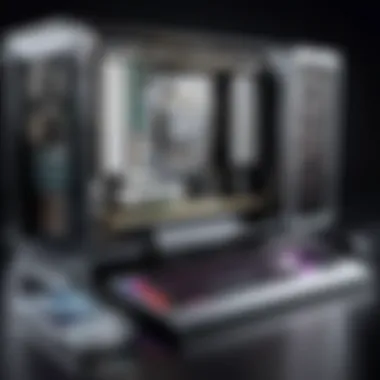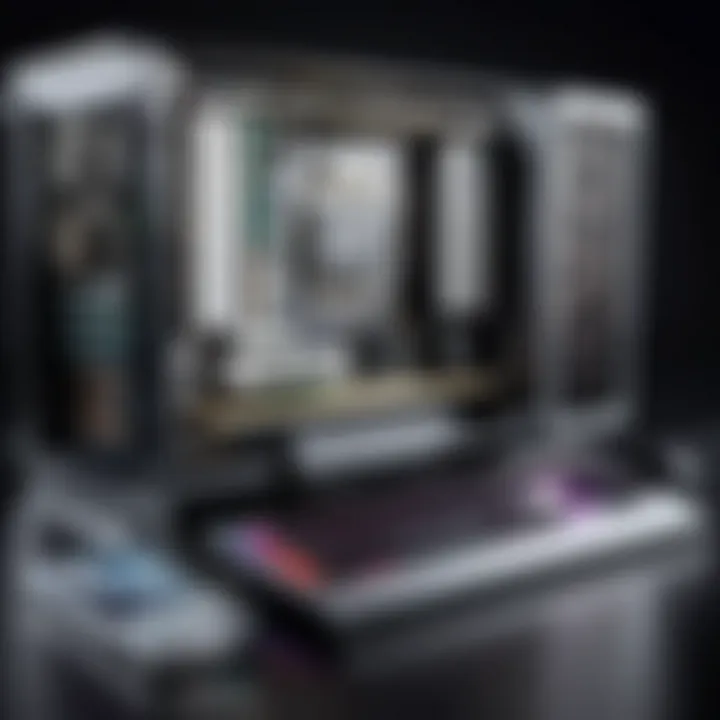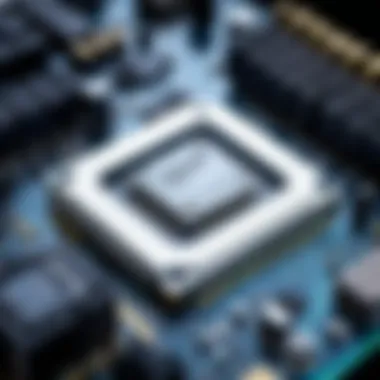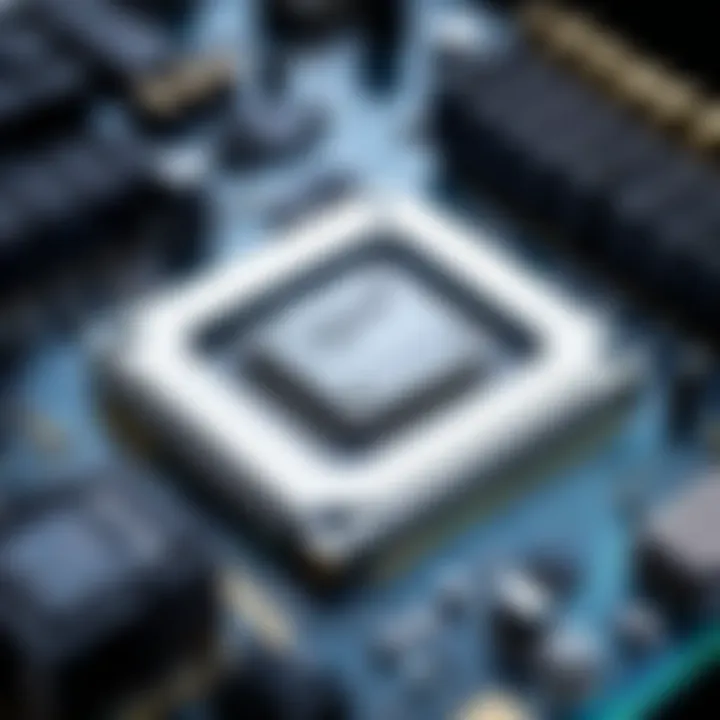Evaluating the 8GB RAM Gaming Computer Experience


Intro
The gaming landscape has evolved significantly over the years, pushing the limits of what hardware can achieve. One compelling question arises for many gamers: is an 8GB RAM gaming computer capable of meeting today’s demands? This article provides a comprehensive examination of an 8GB RAM setup, addressing the hardware requirements, user experience, and potential for future upgrades. Understanding the performance capabilities of such a configuration can be crucial for both casual gamers and esports enthusiasts.
Esports Coverage
In the world of competitive gaming, the hardware performance plays a vital role. While 8GB RAM might seem modest, it's essential to analyze its effectiveness in the modern esports scene. The following subsections explore various aspects relevant to this topic.
Pro-Gaming Tournaments
To participate in pro-gaming tournaments, players often require high-performance systems. However, many competitive arenas operate with systems equipped with 8GB RAM. The optimal performance of these configurations relies on efficient allocation of resources. Gamers participating in tournaments such as League of Legends or Dota 2 often find that 8GB RAM meets their immediate needs. While ultra settings may impact frame rates, lower settings can lead to smoother gameplay.
Player Profiles and Interviews
Insights from professional gamers provide valuable perspectives on hardware choices. Many interviewed players attest that their setups often utilize configurations similar to an 8GB RAM system. For instance, a player might state:
"I focus on FPS and stability. An 8GB setup lets me play competitively, even in complex games." These profiles highlight the practical application of 8GB RAM, showcasing that it can still support high-level play.
Team Strategies and Analysis
Understanding how teams manage their resources is crucial. Many teams embrace strategies that complement their hardware capabilities. Teams often train with various settings and push their systems to find the sweet spot for performance. This adaptability demonstrates that competitive gaming can still thrive within the constraints of an 8GB RAM configuration.
Hardware Testing
Exploring hardware performance is essential to understand the feasibility of an 8GB RAM gaming system. The following subsections provide insight into key hardware components.
Reviews of Gaming Monitors
A high-quality monitor can significantly enhance gaming experiences. Display technologies like LCD or OLED provide different benefits, but pairing them with an 8GB RAM system can ensure smooth visuals. Recommendations often include models such as ASUS ROG Swift or Dell Alienware for their adaptive sync technology to mitigate tearing and stutter.
Performance Analysis of GPUs
Your graphics processing unit directly impacts gaming performance. Combining 8GB RAM with an efficient GPU like the NVIDIA GeForce GTX 1660 Super can lead to satisfactory results. Benchmark tests show that at 1080p, this combination achieves solid frame rates across various modern titles, making it a viable pairing for gamers mindful of budget constraints.
Comparison of Mechanical Keyboards
While not directly linked to RAM, the choice of keyboard enhances user experience. Mechanical keyboards from brands like Corsair or Razer can provide tactile feedback, making gameplay more responsive. Coupling these keyboards with an 8GB RAM system can create a seamless gaming environment important for competitive play.
Game Reviews
Examining modern titles is vital to assess how they perform on an 8GB RAM gaming computer.
Latest Game Releases
Recent games like Cyberpunk 2077 and Call of Duty: Warzone have varying system requirements. While they recommend more than 8GB RAM, players have successfully run these games on lower settings with satisfactory results. This adaptability makes it essential for gamers to optimize their graphics settings accordingly.
Detailed Gameplay Analysis
Analyzing gameplay performance reveals the degree of optimization possible within an 8GB RAM setup. Frame drops during intense scenes may occur, primarily if background applications consume RAM, leading to noticeable lag. Nonetheless, focusing exclusively on gaming can mitigate these issues.
Storyline and Graphics Review
Game narratives and visual quality are essential components for immersion. While an 8GB RAM system may struggle with ultra settings, medium to high settings often yield an engaging experience with visually appealing graphics and compelling storylines.
Preamble to Gaming Computers
The domain of gaming computers represents a vibrant intersection of advanced technology and user experience. Understanding this segment is vital for gamers, from casual users to competitive players. With several hardware components working cohesively, the performance of a gaming setup hinges notably on the individual specifications of each part. As hardware evolves, so do the expectations of gamers, making it essential to explore the characteristics that define gaming computers today.
A primary focus for any gaming system is its RAM. The type and amount of RAM can influence both operational speed and overall gaming performance. Recent trends show that while 8GB RAM systems can cater to a variety of gaming needs, it is critical to analyze their performance across different genres. Thus, dissecting these systems helps set realistic expectations for users. As we delve into the growing requirements of modern games, understanding how the evolution of hardware creates the context for today’s gaming experiences becomes a key consideration.
The Evolution of Gaming Hardware
Gaming hardware has undergone significant transformation since its inception. Early systems were rudimentary, often limited by processing power and memory constraints. As the demand for more immersive gameplay grew, manufacturers responded with enhanced CPUs, GPUs, and RAM capabilities. This evolution paved the way for richer graphics and more complex game mechanics.
In recent years, the push towards high-definition textures and real-time rendering has necessitated an upgrade in RAM specifications. Where desktop gaming systems once functioned adequately with 4GB, the industry standards have shifted. Now, many contemporary games suggest at least 8GB of RAM, with higher specifications becoming increasingly common. Recognizing the trajectory of this hardware evolution not only highlights technological advancements but also underlines the importance of understanding system requirements as games become more tech-intensive.
Defining 'Gaming Computer'


The term 'gaming computer' encapsulates a wide range of systems. While some might think of powerful desktops with high-end specifications, the reality is that gaming computers can vary significantly in form and function. At a minimum, a gaming computer is expected to deliver smooth frame rates and fast load times.
A typical gaming PC configuration includes an efficient processor, a capable graphics card, and adequate RAM. However, beyond hardware, the gaming experience is influenced by peripheral devices like monitors, keyboards, and mice. For prospective gamers, distinguishing a gaming computer from a standard PC rests upon these performance metrics. Whether a system is tailored for casual gaming or competitive eSports largely shapes its definition.
Understanding what constitutes a gaming computer is essential when considering factors such as storage solutions, graphics card capabilities, and, importantly, RAM. This foundational knowledge helps gamers make informed choices, aligning their setups with their specific gaming preferences.
Understanding RAM in Gaming
When diving into the realm of gaming computers, understanding RAM is crucial. RAM, which stands for Random Access Memory, acts as a short-term memory bank for your computer, enabling it to read and write information rapidly. It is vital for multitasking and ensures smooth operation of games, especially when dealing with large files and graphics. This section will illuminate the significance of RAM in gaming configurations, particularly those that feature 8GB.
What is RAM?
RAM is an essential component in any computer system, including gaming machines. It temporarily stores data that the CPU, or Central Processing Unit, requires in real-time. Unlike storage drives, such as SSDs or HDDs, RAM is much faster, allowing for quick access to essential data needed during gaming sessions. The amount of RAM in a system affects its ability to handle multiple processes simultaneously.
In technical terms, RAM is volatile memory, which means it loses its content when the power is turned off. This characteristic makes it distinct from permanent storage options. Understanding RAM's functionality helps gamers appreciate why it is so important when choosing a gaming setup.
The Role of RAM in Gaming Performance
The role of RAM in gaming performance cannot be overstated. Here are some key points to consider:
- Data Management: Games require a lot of resources to run, including textures, 3D models, and physics calculations. RAM manages this data efficiently, ensuring minimal lag during gameplay.
- Multitasking: Gamers often run background applications like Discord, streaming software, or web browsers while gaming. Adequate RAM allows seamless transitions between games and applications without crashing or slowing down performance.
- Load Times: Systems with greater RAM can preload data more effectively. This translates to shorter load times in games, enhancing the gaming experience.
"The amount of RAM directly impacts how fluidly a game runs, especially in resource-demanding scenarios."
Despite the common belief that higher RAM always guarantees better performance, it is essential to understand the interplay between RAM and other system components like the CPU and GPU. For instance, an 8GB RAM system coupled with a high-performance graphics card may outperform a system with 16GB of RAM but weaker hardware.
Thus, while 8GB of RAM can suffice for many gaming scenarios, the overall configuration ultimately determines the quality of the gaming experience.
Specifications of an 8GB RAM Gaming Computer
The specifications of a gaming computer are crucial when assessing its performance and suitability for various gaming genres. An 8GB RAM configuration can serve as a foundation for entry-level to mid-range gaming setups. However, this setup hinges on other essential hardware components. Each specification brings specific strengths and weaknesses that directly impact gaming experience.
Processor Compatibility
The central processing unit (CPU) is the heart of any gaming computer. Choosing the right CPU is vital for maximizing the performance of an 8GB RAM setup. Modern games often demand high processing power, especially those with intricate game mechanics or expansive worlds. Popular choices include AMD Ryzen 5 and Intel Core i5, which provide a balance between cost and performance. Make sure the CPU is compatible with the motherboard to avoid issues.
When pairing with a graphics card, consider CPUs that support advanced features like PCIe 4.0. This ensures that data can flow efficiently between the CPU and GPU, enhancing overall system performance. It’s also prudent to look for processors with higher clock speeds and multiple cores, as these attributes can significantly improve gaming responsiveness.
Graphics Card Considerations
The graphics card significantly influences the visual quality of games. A great graphics card complements the 8GB RAM to provide a better gaming experience. Brands like NVIDIA and AMD dominate this market. When choosing a GPU, consider performance benchmarks alongside your preferred gaming genres. Games like first-person shooters or battle royales may benefit from higher frame rates, making powerful GPUs like the NVIDIA GeForce RTX 3060 or AMD Radeon RX 6600 key considerations.
Key Points to Remember:
- Ensure the graphics card does not bottleneck performance due to RAM limitation.
- Look for GPUs with support for DirectX 12 for enhanced graphics and performance capabilities.
- Consider VR-ready cards if virtual reality gaming is of interest.
Storage Solutions
Effective storage solutions also play a significant role in gaming performance. An 8GB RAM setup should ideally include solid-state drives (SSDs) for faster load times and improved system responsiveness. SSDs drastically reduce game loading periods compared to traditional hard drives (HDDs). For optimal results, consider NVMe SSDs, which offer higher data transfer speeds and greater efficiency.
Opt for a combination of storage types if budget allows—use a smaller SSD for your operating system and key games, while employing an HDD for larger file storage. As games continue to grow in size, having sufficient storage is vital.
In summary, the specifications of an 8GB RAM gaming computer extend beyond just the RAM itself. Processor compatibility, graphics card performance, and efficient storage solutions all intertwine to form a complete gaming experience. Evaluating these elements helps gamers make informed decisions, ensuring they get the most out of their 8GB RAM setup.
Performance Metrics for 8GB RAM Systems
Assessing performance metrics in an 8GB RAM gaming computer is crucial in determining its viability for modern gaming demands. Investors in gaming hardware need to understand how memory impacts gameplay, particularly in relation to speed and efficiency. Thus, performance metrics not only illuminate the power of the computer but also guide prospective buyers in making informed choices. By focusing on benchmarking performance, analyzing frame rates and latency, as well as understanding load times in modern games, gamers can better appreciate the capabilities and limitations of a system equipped with 8GB RAM.
Benchmarking Performance
Benchmarking is an essential method for evaluating the efficiency of an 8GB RAM gaming system. This process involves running standardized tests that provide objective data on performance in various scenarios. Key tools used for benchmarking include software such as 3DMark, PassMark, and Cinebench. These programs simulate demanding tasks, allowing users to see how the hardware performs under pressure.
When it comes to gaming, benchmarks offer insights into how smoothly games can run and how high-quality settings can be comfortably used. Such comparisons may reveal that while an 8GB RAM system can handle many titles adequately, issues may arise in resource-intensive games, where performance dips might become noticeable. In situations where high-resolution textures and complex animations are prevalent, for example, the limitations of 8GB RAM can become apparent.
Frame Rates and Latency Analysis
Frame rates serve as a critical performance metric for gamers. They describe how many frames the system can render per second. For an optimal gaming experience, a frame rate of at least 60 FPS (frames per second) is desirable. However, in complex scenes or when running demanding titles, this can fluctuate drastically, especially on an 8GB RAM setup.
Latency, on the other hand, refers to the delay before a transfer of data begins following an instruction for its transfer. Low latency is key in fast-paced gaming scenarios, where every millisecond counts. An 8GB RAM gaming machine might experience higher latency especially when multitasking or running applications in the background that also demand memory resources. This can lead to a reduction in responsiveness during gameplay, which is especially critical for competitive players.


Load Times in Modern Games
Load times in any gaming experience can greatly influence user satisfaction. In an 8GB RAM system, loading times can be significantly influenced by both the speed of the RAM and the overall system architecture. With current titles becoming increasingly larger, the demand on RAM continues to grow. Therefore, adequate load times can only be achieved through a balance of RAM and efficient storage solutions.
When examining load times, it is essential to consider how data is streamed within a game. While an 8GB RAM system may suffice in older games, contemporary titles often require more memory, leading to prolonged load periods. Although solid-state drives (SSDs) may alleviate this bottleneck to some extent, the need for higher RAM capacity remains a valid concern for future-proofing gaming systems. Understanding these metrics helps gamers gauge how well their setups can anticipate modern gaming requirements.
Gaming Experience with 8GB RAM
Understanding the gaming experience with an 8GB RAM system is essential for gamers evaluating their setup. RAM plays a considerable role in determining the smoothness of gameplay, the ability to run multiple applications, and overall performance. The optimal experience often hinges on striking the right balance between hardware capabilities and game requirements.
Casual vs. Competitive Gaming
Casual gaming is generally less demanding than competitive gaming. Gamers who enjoy titles like puzzle games or simple mobile games might find 8GB RAM sufficient. These games typically do not require extensive resources. In contrast, competitive gaming often requires higher performance to achieve the best experience. Fast-paced games like Counter-Strike: Global Offensive or Fortnite demand quick response times and an ability to manage multiple processes simultaneously.
- Casual Gaming:
- Competitive Gaming:
- Suitable for many indie games and older titles.
- Users can enjoy vibrant graphics without heavy lag.
- Often allows for streaming and background applications without issues.
- Requires higher frame rates and lower latency.
- Can experience slowdowns if too many tasks are managed at once.
- Limited multitasking capability could hinder performance in crucial situations.
In competitive environments, having 16GB of RAM may provide an edge in performance. However, the experience can remain adequate with 8GB if one carefully manages background applications and understands the demands of the specific titles being played.
Multitasking While Gaming
The ability to multitask while gaming is another critical factor to consider when operating on an 8GB RAM system. In many gaming scenarios, players may wish to run additional applications like voice chat tools, streaming software, or even a browser for help guides. However, 8GB RAM may quickly become a bottleneck in these situations.
- Advantages:
- Challenges:
- Allows for some background tasks which enhance user experience.
- Streaming software can run alongside games without significant lag in many cases.
- Performance may notably dip if the game requires significant RAM to run, causing interruptions in gameplay.
- Applications like Discord can consume resources, leading to potential slowdowns.
Players engaging in competitive gaming should consider limiting background processes to maintain performance. Adjusting game settings and being aware of RAM usage can help optimize the experience. Ultimately, an 8GB RAM setup can enrich casual gaming, but it may fall short in demanding competitive scenarios.
Limitations of an 8GB RAM Gaming Computer
Understanding the limitations of an 8GB RAM gaming computer is crucial for both casual and serious gamers. While 8GB of RAM is often sufficient for many current titles, it may not provide an optimal experience across all genres. The scope of this discussion extends to future-proofing considerations, gaming genre impacts, and overall system performance. In a rapidly evolving gaming landscape, recognizing these constraints enables informed purchasing and upgrading decisions.
Future-Proofing Concerns
In an industry characterized by continuous advancements, future-proofing is essential. An 8GB RAM setup may support current games well, but future titles could require more memory due to improved graphics and expanded worlds. As game developers enhance player experiences with intricate details and elaborate environments, the need for additional RAM becomes apparent.
Future-proofing concerns stem from the following:
- Game Requirements: Many modern titles recommend or even require 16GB of RAM for optimal performance.
- Longevity of System: An 8GB RAM system may limit the lifespan of a gaming setup, necessitating upgrades sooner.
- Multitasking: With increasing demands for multitasking, such as running streaming applications alongside games, system stability can suffer.
By understanding these factors, gamers can evaluate whether an 8GB configuration is a prudent investment.
Gaming Genres Impacted by RAM Limitations
The impact of RAM limitations varies significantly across different gaming genres. Recognizing how each genre utilizes RAM is vital for players who want to maximize their gaming experience.
MMORPGs
Massively Multiplayer Online Role-Playing Games (MMORPGs) are a key area affected by RAM limitations. These games often demand extensive resources to manage large numbers of players concurrently. Key characteristics include:
- Rich Environments: MMORPGs feature expansive worlds with numerous assets to load.
- Player Interaction: High player counts lead to significant simultaneous data processing.
The result is that while 8GB can run many MMORPGs, memory constraints may lead to hiccups during high traffic scenarios. Players might experience lag or longer load times due to insufficient RAM under peak conditions.
Open-World Games
Open-world games provide expansive exploration opportunities. However, their nature can be hindered by limited RAM. Key aspects to consider include:
- Detail Richness: These games often have detailed environments and dynamic activities.
- Resource Management: They depend on substantial memory to load elements in real-time.
Consequently, players with an 8GB setup might notice performance drops, especially when numerous assets populate the screen. The disadvantages manifest as frame rate drops or delayed responses when navigating diverse environments.


RTS Games
Real-Time Strategy (RTS) games require strong memory capabilities to manage numerous units and resources simultaneously. The unique features encompass:
- Complexity of Gameplay: RTS games often involve multitasking and require processing vast amounts of data in real time.
- Unit Management: As players command various units, the need for efficient memory grows.
In this case, gamers with only 8GB RAM may face limitations, especially during tense moments with many on-screen units. Performance may diminish, altering the competitive edge that is critical in RTS scenarios.
Ultimately, acknowledging these genre specifics allows potential buyers to make more informed choices. Investment in higher RAM systems may be warranted for those who engage with demanding genres.
Assessing the limitations of an 8GB RAM gaming computer reveals significant implications for gaming performance and user satisfaction. Armed with this knowledge, gamers can navigate their options more effectively.
Cost-Effectiveness of 8GB RAM Systems
In the ongoing debate about the most efficient gaming setups, the cost-effectiveness of an 8GB RAM system remains a crucial topic. Gamers are often on the lookout for optimal performance without overspending, making it necessary to analyze how an 8GB RAM configuration fits within this framework. In this section, we will explore various elements that affect cost-effectiveness, including comparing performance aspects with budget considerations, as well as the implications of higher RAM systems.
Budget vs. Performance Trade-offs
When selecting components for a gaming rig, the budget is typically a primary concern for many users. An 8GB RAM gaming computer can provide a balance between affordability and gaming performance. While higher RAM options are available, they come with increased costs.
Here are some key reasons why an 8GB RAM setup can be seen as cost-effective:
- Initial Investment: Components featuring 8GB of RAM are often less expensive than their counterparts with higher capabilities. This allows gamers to allocate funds to other critical parts, such as the processor or graphics card.
- Performance Needs: Many modern games are optimized to run efficiently on an 8GB RAM setup, particularly less demanding titles or specific gaming genres. For casual gamers, an 8GB system may suffice without diminishing the experience.
- Upgrade Path: Starting with 8GB RAM can provide a low entry point. If users find they require more RAM in the future, upgrades are straightforward and often more feasible on a budget than starting with a much higher initial investment.
However, it is essential to consider that while initial performance is adequate, the limitations of an 8GB system may become apparent as gaming demands evolve.
Comparative Analysis with Higher RAM systems
When examining 8GB RAM setups against those with higher capacities, several factors must be considered:
- Performance Gains: Higher RAM systems, such as those equipped with 16GB or more, can handle multitasking much better. For instance, they are more efficient in gaming while running background applications, which is important in competitive environments.
- Future-Proof: As game titles advance, their requirements may exceed what an 8GB setup can provide today. Certain genres, especially larger open-world games or MMORPGs, may start to see performance lags with only 8GB of RAM. Increased storage can be a deciding factor in ensuring smooth gameplay for future titles.
- Long-term Investment: Investing in higher RAM may appear costly at first. In the long run, it might save gamers from needing to upgrade as frequently. For dedicated gamers, a more substantial initial investment could lead to better performance across a wider range of titles over time.
To summarize the analysis, gamers should:
- Identify their primary gaming needs and determine if they fall within the capabilities of an 8GB RAM setup.
- Consider the potential need for an upgrade based on gaming genre preferences and future titles.
- Balance their budget with performance expectations to find an optimal solution for their gaming experience.
Recommendations for Optimal Use
In modern gaming, a computer’s specifications are crucial to the overall experience. This section provides recommendations to maximize the utility of an 8GB RAM gaming computer. It is important for users to understand how to optimize their systems, ensuring a smooth and enjoyable gaming session while being mindful of both performance and budget constraints.
Upgrading from 8GB RAM
Upgrading from 8GB RAM can have significant positive impacts on gaming performance. Many modern games are designed to utilize more RAM, especially those that feature expansive worlds or complex graphics. For esports enthusiasts and serious gamers, an upgrade to 16GB or more improves multitasking capabilities. It allows running multiple applications, such as game clients, streaming software, and chat programs without noticeable lag.
Considerations for upgrading also include the motherboard's capacity to support additional RAM. Users should verify compatibility with their current setup. Moreover, involvement in gaming genres that demand high performance, such as MMORPGs or open-world games, directly benefits from increased memory.
Some specific benefits of upgrading include:
- Improved Load Times: More RAM tends to reduce load times and improve responsiveness during gameplay.
- Smooth Multitasking: Running background applications while gaming becomes more seamless with higher RAM.
- Future-Proofing: As gaming technology evolves, so do the requirements. Investing in more RAM now can extend the life of your gaming rig.
Enhancing Performance with Software Configurations
Software configurations play a critical role in the performance of an 8GB RAM system. By adjusting settings within both the operating system and individual games, users can vastly improve their experience.
- Game Settings: Many modern games allow you to adjust graphics settings. Lowering resolution and detail settings can optimize performance, particularly in high-demand scenarios.
- Background Applications: Closing unnecessary applications before gaming can free up RAM, allowing the game to utilize available resources effectively.
- System Optimization Tools: Using software like CCleaner or disk defragmenters can help maintain your computer's efficiency. Keeping the system tidy often leads to noticeable performance improvements.
An example for optimizing your gaming client can be illustrated in a sample configuration file:
This configuration reduces workload on the system while maintaining a satisfactory level of graphic quality.
"Upgrading RAM along with fine-tuning system settings can create a substantial difference in gameplay performance."
The End
The importance of this conclusion lies in summarizing the key insights discussed throughout the article. A detailed analysis has revealed that while an 8GB RAM gaming computer serves as a viable entry point for many gamers, it carries certain limitations that can affect the overall gaming experience.
Recap of Key Findings
- Performance Viability: The performance of an 8GB RAM system can be satisfactory for many casual games and esports titles, but it often falls short in demanding genres like open-world games or MMORPGs.
- Cost-Benefit Assessment: Investing in an 8GB RAM setup is often about sacrificing high-end performance for a more budget-friendly option. This trade-off can be justified if one’s gaming preferences align with lighter titles.
- Future-Proofing: The evolving landscape of video games suggests that as game requirements increase, an 8GB configuration may soon become obsolete. Gamers should seriously consider their long-term needs before committing to such systems.
- Upgrade Options: We discussed various paths for enhancing an 8GB RAM setup, including upgrading RAM and optimizing software settings. Such steps can help mitigate some limitations.
- User Experience: Casual gamers may find satisfaction in less demanding games, while competitive gamers might prioritize higher specifications for performance.
Final Thoughts on 8GB RAM Gaming Systems
The decision should not only take current needs into account but also consider potential future gaming trends. It's an essential balance between what is available now and what might be necessary in gaming's unforgiving advancement. Ultimately, an informed choice can significantly enhance one’s gaming journey.
To stay updated on gaming trends and hardware, consider engaging with communities on platforms like Reddit or utilizing resources such as Wikipedia for further research.



